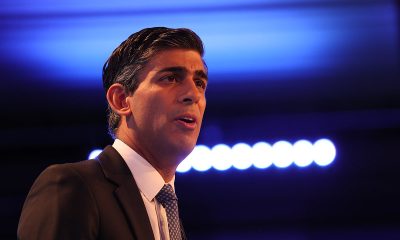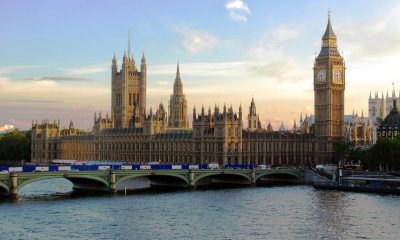News
Death sentences of Shiites point to limits of Saudi reforms
![Example of mirror writing in Islamic calligraphy. 18th-century Ottoman levha, or calligraphic panel, which depicts the Shi'i phrase 'Ali is the vicegerent of God' (Arabic: علي ولي الله) in obverse and reverse, creating an exact mirror image. (Photo By Mahmoud Ibrahim - Library of Congress[1], Public Domain)](https://canadianinquirer.net/v1/wp-content/uploads/2017/08/640px-Mirror_writing2.jpg)
Example of mirror writing in Islamic calligraphy. 18th-century Ottoman levha, or calligraphic panel, which depicts the Shi’i phrase ‘Ali is the vicegerent of God’ (Arabic: علي ولي الله) in obverse and reverse, creating an exact mirror image. (Photo By Mahmoud Ibrahim – Library of Congress[1], Public Domain)
The country’s supreme court recently upheld the death penalty in the case, raising concerns among rights activists that the group could be executed at any moment.
Human rights groups allege the trial was unfair, saying the defendants’ confessions were extracted under duress and that some did not have lawyers present in court. Three of the defendants were 17 years old when the alleged crimes were committed.
A defence lawyer contacted by The Associated Press declined to speak, saying he is officially barred from talking about the case with the media.
The mother of one of the defendants said her son’s lawyer was pressured to quit his defence and so withdrew from the trial, leaving her son to represent himself.
“He had to defend himself and answer his own questions in court,” said Zahra Abdullah, the mother of defendant Munir al-Adam. “I am demanding either a just trial or their release,” she added. “To issue the death penalty for protests isn’t right.”
Also facing execution is Mujtaba al-Sweikat, a young Saudi man who had been accepted to attend Western Michigan University before his arrest. The American Federation of Teachers, which says it represents 1.6 million members nationwide, is urging President Donald Trump to demand that Saudi Arabia halt the executions.
In response to the outcry, the Saudi Justice Ministry issued a rare statement defending its judicial process and the verdicts. It said the 14 were convicted of “terrorist crimes” that included killing civilians and security officers.
The ministry said the group received a fair trial, and that three different courts and a total of 13 judges examined the case. The ministry said severe punishment is handed down only in cases where the most dangerous crimes are committed.
Abdullah says her son took part in protests to demand equality and greater rights. Among the charges he faced were throwing rocks at police and firing on a police checkpoint. She says her son denies the charge of firing on police.
Scholars of Islamic law, or Shariah, hold vastly different views on the application of the death penalty. Under the kingdom’s interpretation of Shariah, judges have wide discretion to rule and hand down death sentences for lethal as well as non-lethal offences.
The kingdom has one of the highest rates of execution in the world. Last year, 47 people were executed on one day, including a prominent Saudi Shiite cleric convicted for his role in violent protests. The cleric, Nimr al-Nimr, denied the charges of sedition. His supporters say he was punished for being an outspoken government critic and a key leader of the Shiite protests in eastern Saudi Arabia in 2011 and 2012.
The group of 14 were charged for their role in those same protests.
Reprieve, an advocacy group that opposes the death penalty, said it has established that at least one of the defendants was never permitted to see a lawyer. In al-Adam’s case, no evidence against him was presented at trial, said Reprieve.
Activists say there is growing cause for concern after the kingdom executed four Shiites in July convicted on charges of terrorism for their role in the same protests and violence with security forces.
On Friday, 10 Nobel Peace Prize winners appealed to King Salman and his son, the crown prince, to halt the executions.
Human Rights Watch says that if Saudi Arabia’s new leadership is serious about reform, “they should immediately step in to stop these executions.” In a joint statement, Human Rights Watch and AmnestyInternational said the rise in death sentences against Shiites in Saudi Arabia “is alarming and suggests that the authorities are using the death penalty to settle scores and crush dissent under the guise of combating ‘terrorism.”’
Underpinning much of these tensions is a region-wide rivalry between Sunni-led Saudi Arabia and Shiite-led Iran. Al-Nimr’s execution led to a severing of ties.
In sermons and on Twitter, Saudi Arabia’s ultraconservative clerics refer to Shiites as “rafida,” an Arabic slur for “rejectionists.” They condemn Shiite rituals, like praying at the tombs of revered figures, as an aberration of Islam and accuse Shiites of being faithful to hard-line clerics in theocratic Iran.
Saudi Shiites, who are a minority in the kingdom but make up the bulk of the population in the kingdom’s eastern region, have been targeted by extremists in recent years. A number of bombings have struck Shiites mosques in the east.
Saudi Crown Prince Mohammed bin Salman, who was elevated as heir to the throne in late June, has fashioned himself as a modernizer. He’s set out lofty goals for the kingdom to achieve by 2030, promising a dramatic shake-up, but has given no indication he is willing to address Shiite grievances.
Prince Mohammed raised eyebrows during an interview in May when he framed his country’s rivalry with Iran in sectarian terms, saying there could be no dialogue with Iran because it is trying to spread a messianic Shiite doctrine.
Nowhere are sectarian tensions in Saudi Arabia more visible than in the eastern town of al-Awamiya, the hometown of al-Nimr, the executed cleric.
Around two dozen people, including security forces and local militants, have been killed there this year there. Violence spiked in May after the government began demolishing the city’s historic centre, including hundreds of homes. The government says the area was being used to provide cover for wanted criminals. Among those killed in the unrest is a three year-old boy who died last week. Residents in al-Awamiya say he was shot by Saudi security forces while in the backseat of a car.
Abdullah says her son was 18 years old at the time of his arrest. He’d found work at a factory outside al-Awamiya and had dropped out of school because the family was struggling financially. He complained there were no jobs, even for college graduates.
“As Shiites we have been targeted for a long time. There is no equality. All the government posts and influential positions are not for us,” she said.
——





















